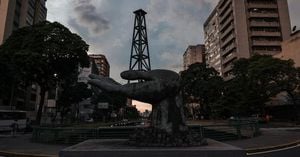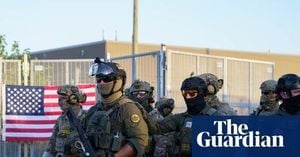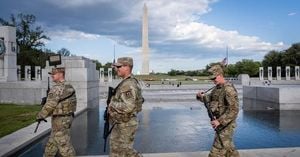On October 1, 2025, the debate over deploying military forces in American cities reached a boiling point, as House Speaker Mike Johnson publicly endorsed President Donald Trump’s controversial proposal to use high-crime urban areas as “training grounds” for the military. The announcement, backed by several Republican leaders, has triggered a fierce national conversation about public safety, civil liberties, and the proper role of the armed forces on domestic soil.
Appearing on CNN’s “Inside Politics,” Johnson emphasized his close relationship with President Trump and his support for the plan, specifically highlighting the use of National Guard troops. “I can tell you what’s in the president’s mind and heart, because I talk to him all the time daily about this. He’s very proud of the fact that we have brought crime down in Washington, D.C. You could go from your car to the studio today without fear of somebody jumping you,” Johnson stated, according to Nexstar Media Inc. He went on to call the strategy a “win-win scenario,” arguing, “National Guardsmen are proud of that duty that they performed, and they brought crime down dramatically in D.C. And all of us are safe. Our staffs are safe. They’re not walking in fear right now. I think we should do that in every major city run by Democrats who aren’t serious.”
President Trump himself doubled down on the approach during a high-profile address to top generals and admirals at Quantico, Virginia, on September 30. Declaring a “war from within,” Trump insisted that military force was necessary to quell violence in Democratic-led cities. “I told [Defense Secretary Pete Hegseth], we should use some of these dangerous cities as training grounds for our military—National Guard, but our military, because we’re going into Chicago very soon,” Trump said, pointedly describing Chicago as “a big city with an incompetent governor.”
The proposal is not limited to Chicago. Trump has discussed sending troops to Portland, Oregon, and Memphis, Tennessee, as well. National Guard members have already been sent to Washington, D.C., and both National Guard and Marines have been deployed to Los Angeles. The president’s supporters argue these measures have reduced crime and restored safety, citing the example of Washington, D.C.
Yet, the plan has ignited sharp criticism from Democratic officials and civil liberties advocates. Many see it as a dangerous escalation that risks inciting fear, uncertainty, and even violence. Senator Ruben Gallego of Arizona, himself a military veteran, minced no words on CNN: “The president was an ‘idiot’ for suggesting cities be used as training grounds.” Gallego predicted widespread civil protests if such military actions were attempted, adding, “Most U.S. citizens will stand against that in civil protests, and you’ll have many of us joining them in that if they try to do such a thing.”
Former President Barack Obama, earlier in 2025, also warned of the perils of expanding military use on domestic soil. “The erosion of basic principles like due process and the expanding use of our military on domestic soil puts the liberties of all Americans at risk, and should concern Democrats and Republicans alike,” Obama wrote on social media, highlighting the bipartisan nature of the concerns.
In New Orleans, where Republican Governor Jeff Landry has requested up to 1,000 National Guard troops to help fight crime in Shreveport, Baton Rouge, and New Orleans, the situation is particularly complex. Landry’s request, sent to Defense Secretary Pete Hegseth, cited “elevated violent crime rates” and shortages in local law enforcement. However, Hans Ganthier, the assistant superintendent of New Orleans’ police department, pushed back on the premise that crime is rising. “Our crime rate is going down,” Ganthier told reporters, noting that New Orleans is on pace to have its lowest number of killings in more than five decades. As of September 27, the city had recorded 84 homicides in 2025, compared to 124 in 2024 and 193 in 2023. Other serious crimes—including armed robberies, aggravated assaults, carjackings, shootings, and property crimes—have also declined.
Despite these statistics, Ganthier expressed a pragmatic willingness to work with the National Guard, stating, “We collaborate well with anyone, whether it is the state police, federal government, federal agents, different parishes, and the National Guard shouldn’t be any different. If they can help us, be a multiplier for our forces, I welcome them.”
Louisiana’s Republican U.S. Senator Bill Cassidy echoed a similar sentiment, describing National Guard deployments as “not a permanent solution,” but arguing, “Increased law enforcement decreases crime, no matter the color of the uniform.”
Not everyone in New Orleans is convinced. City Council President J.P. Morrell voiced concerns about the potential impact on local traditions, especially the city’s famous brass band parades, known as “second-lines.” “The last thing they want is the National Guard stumbling across a second-line and trying to do crowd control on their own,” Morrell remarked, reflecting fears that a military presence could disrupt the city’s unique culture.
The prospect of troop deployments has also heightened tensions in Chicago, where a federal immigration crackdown began nearly a month ago. The federal immigration processing center in Broadview, just west of downtown Chicago, has become a flashpoint, with local police investigating federal agents for allegedly using chemical agents and aggressive tactics against protesters. Broadview Police Chief Thomas Mills warned, “We are experiencing an immediate public safety crisis.” Department of Homeland Security officials, meanwhile, dismissed the claims as “bogus.”
In Oregon, Democratic Attorney General Dan Rayfield has taken legal action to block the Trump administration’s deployment of the National Guard. Rayfield filed a motion in federal court seeking a temporary restraining order, after the Defense Department notified state leaders that 200 National Guard members would be placed under federal control for 60 days to “protect Federal property, at locations where protests against these functions are occurring or are likely to occur.” The deployment, which would cost the federal government at least $3.8 million, is being challenged by local leaders, including Portland Mayor Keith Wilson and Governor Tina Kotek, who object to the federalization of state forces. The troops, drawn from military police and infantry units, are required to complete several days of administrative processing and training before deployment. A federal court hearing on Rayfield’s motion is scheduled for October 3.
Meanwhile, in Memphis, Tennessee, a new federal task force—dubbed the Memphis Safe Task Force—has already begun operations. According to U.S. Attorney General Pam Bondi, 219 officers have been deputized, with nine arrests made on September 29 as part of the crackdown ordered by President Trump.
As the debate rages, both sides seem to agree on one thing: the stakes are high. Supporters argue that strong, visible law enforcement is necessary to restore order and protect communities, while critics warn that military involvement in domestic policing threatens the very fabric of American democracy. With federal court battles looming and cities across the country bracing for further deployments, the nation is left to grapple with profound questions about safety, freedom, and the boundaries of government power.



